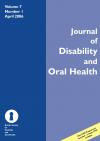Journal of Disability and Oral Health

- Cover Date:
- April 2006
- Print ISSN:
- 1470-8558
- Electronic ISSN:
- 1754-2758
- Vol:
- 7
- Issue:
- 1
Oral hygiene status and behaviour of the special needs children in Lahore, Pakistan
Aim: To investigate the oral health status of individuals with intellectual and medical disabilities in Lahore and compare the results with an age and gender matched healthy control group. Material and methods: A cross-sectional study conducted on 424 individuals with a mean age of 10.7 years (age range: 6–17years) at two day schools for individuals with intellectual impairment and Down syndrome. Medically compromised subjects were recruited from the paediatric ward of a local hospital. Age and gender matched controls were selected from one school. Outcome measures: Oral hygiene status and tooth brushing practices. Results: Medically compromised individuals reported highest mean OHI(S) values (poorest oral hygiene) among the three groups. The mean difference was significant between the groups (p< 0.05). Among the compromised individuals, those with insulin dependent diabetes mellitus (IDDM) had poor oral hygiene, followed by persons with mild intellectual impairment. The oral hygiene status of sub-classes of intellectually disabled and medically compromised groups was significantly poorer when compared to normal individuals (p < 0.05). However, the mean difference was not significant among the individual disability groups (p > 0.05). Individuals with special needs had irregular tooth brushing practices when compared with their normal counterparts. The difference between the groups was statistically significant at (p < 0.05). The two main disability groups (intellectual impairment and medically compromised) did not differ significantly in their brushing practices (p=0.602). Conclusions: Individuals with special health care needs had poor oral hygiene and irregular tooth brushing practices as compared to their normal counterparts. There is an essential need to improve the oral health status of this neglected group in society. Key words: Oral hygiene, intellectual impairment, medically compromised, tooth brushing practices
- Article Price
- £15.00
- Institution Article Price
- £15.00
- Page Start
- 43
- Page End
- 47
- Authors
- Bushra Azad, Noorya Ibrahim, Hafeez Kaleem, Ayyaz Ali Khan, Y Takata, Nazia Yazdanie, Muhammad Shoaib
Articles from this issue
- Title
- Pg. Start
- Pg. End
- A comparison of the effectiveness of chlorhexidine varnish, fluoride varnish and fluoride gel in children with intellectual disability
- 10
- 16
- An approach to the restoration of fractured anterior teeth in adolescents with intellectual impairment
- 25
- 28
- The use of hypnosis and systematic desensitisation in the management of dental phobia: a case report
- 29
- 34
- Mortality after full mouth rehabilitation under general anesthesia for a child with Tetralogy of Fallot: report of a case
- 35
- 42
